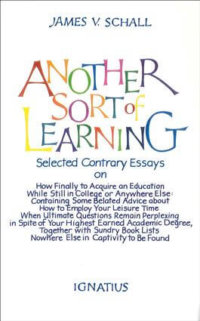Another Sort of Learning

Another Sort of Learning: Selected Contrary Essays on How Finally to Acquire an Education While Still in College or Anywhere Else: Containing Some Belated Advice about How to Employ Your Leisure Time When Ultimate Questions Remain Perplexing in Spite of Your Highest Earned Academic Degree Together with Sundry Book Lists Nowhere Else in Captivity to be Found. James V. Schall. San Francisco: Ignatius Press.
In the preface, Schall cites Voegelin about one going through higher education without ever having to confront the most basic and existential questions of human existence:
“The quest for the ground . . . is a constant in all civilizations . . . The quest for the ground has been formulated in two principal questions of metaphysics. The first question is ‘Why is there something; why not nothing?’ and the second is, ‘Why is that something as it is, and not different'” (8).[1]
For Schall, the search to answer these questions takes “place outside the normal educational process and outside the myriad of media images and opinions with which we are constantly confronted” (10). The essays in this volume addresses these questions, contrary to the increasingly demands of the moment, in order to create a space where students can step back from their daily routines and reflect upon questions of ultimate meaning and significance. The book is grouped into three themes: 1) “So You’re Still Perplexed Even in College?”; 2) “Books You Will Never Be Assigned”; and 3) “Have You Thought about It This Way?” Each essay is short, accessible, and lucid but without being superficial or self-indulgent. And after each essay is a list of books for the reader to continue an exploration of the questions raised by Schall.
The first theme – “So You’re Still Perplexed Even in College?” – addresses the fundamental questions of human existence – why something and not nothing and why is that something as it is, and not different – that are often neglected in students’ university education. Whether is the value of used book stores and how they are needed to sustain a literate culture or what is required of students towards their teachers (good will, self-confidence, trust, effort, thinking, and docility) and the questionable value of grades, Schall wants students to see education as an end in itself, as a type of leisure where one contemplates about the highest things. He is trying to create a culture of learning for its own sake to exist outside of the classroom so that students can continue to think about the most important things after they graduate.
The second theme – “Books You Will Never Be Assigned” – is Schall’s examination of works of authors that he believes provides insight into the most important things of life. Schall writes about the need of both revelation and reason for political philosophers to analyze reality properly, like Aquinas did in his theological works, Shakespeare in his plays, Chesterton in his apologetics, or Belloc in his various and numerous writings. Each of these essays not only explore these individuals’ works but also raises questions about them and encourages the reader to engage in a conversation with them.
There are three essays in this section that do not quite fit with this theme and probably should have been a separate group. The first about the responsibility of evil and suffering, a book review of Jeffrey Burton Russell’s Lucifer: The Devil in the Middle Ages; the second is about the role of ideology in Rael Jean Isaac’s and Eric Isaac’s The Coercive Utopians; and the third is about Henry Veatch’s Human Rights: Fact or Fancy? Although each essay illuminates important questions and themes in these books, they seem out of place with the essays on Aquinas, Shakespeare, Chesterton, and Belloc.
The final group of essays – “Have You Thought about It This Way?” – explores the permanent things in our life, whether the humanities, teaching, prayer, or philosophy. In “The Recovery of the Permanent Things,” Schall writes about the importance of Christ’s Incarnation as the recognition of the value of the individual soul and to bring it in a closer relationship with God. This recovery of the permanent things can transpire in a variety of ways, such as teaching (“What is a Lecture?”), devotion and prayer (“On Devotion”; “On Prayer and Fasting for Bureaucrats”; and “On the Difficulty of Believing and Not Believing”), sports (“On the Seriousness of Sports”), and the search for truth irrespective of public and private demands (“The Humanities and the ‘Basis of Excellence’”). All these activities aim for contemplation of the divine, whether philosophically, spiritually, or both (“On Spiritual and Intellectual Life”).
Another Sort of Learning is a counterpoint to what is taught in the university classroom and the contemporary culture of today: it asks us to reflect upon the purpose and meaning of life and questions the validity of what we are formally taught. Readers will find it not only a delight but allow them a moment to pause and reflect upon the conditions that make us human and why we exist in the world. By asking the most serious questions in the liveliest of manners, Schall gently encourages us to go down a different path than what society wants from us.
Notes
[1] Eric Voegelin, Conversations with Eric Voegelin, ed. Eric O’Connor (Montreal: Thomas More Institute, 1980), 2.
Also see our review of James V. Schall’s Docilitas.




